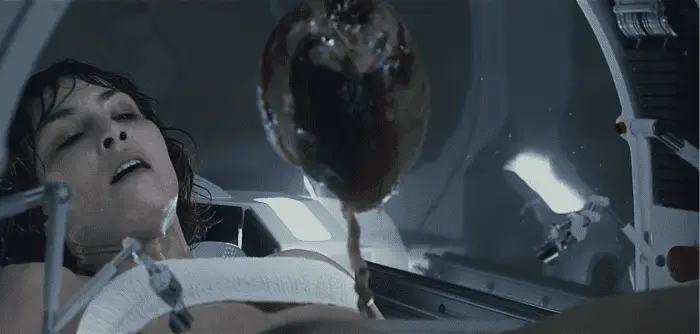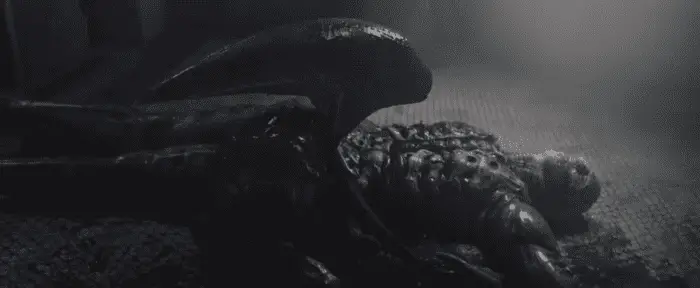I would call Prometheus the second-best movie in the Alien series. Okay, before you laugh and click away, at least hear me out. I think there’s a lot to like about Prometheus that’s often overlooked. Sure, there are some questionable callbacks to the first movie, and David’s motivation isn’t the clearest, but there’s still a ton of clever theming and nuance that is incredibly easy to miss. So, let’s break it down, piece by piece, starting with the big one:
Characters and Pride
One of the biggest criticisms of Prometheus is that the characters don’t act like people. They constantly do dumb things, like pet alien snakes and take off their helmets in unfamiliar ecosystems. At first blush, they all seem like they’re just the dumbest jackasses to set foot in a spaceship, but its important to look beyond that, to see what the movie is saying, rather clearly, with these moments.
Prometheus is clearly about pride. David constantly asks the characters why they want to meet their creators, challenging them to think whether their creators would want to meet them. The crew always answer to the affirmative, never wondering why their creators might not.
When Weyland does come face to face with an Engineer, he’s immediately killed. The moments before his death he is filled with hubris, positive the Engineer will be proud of what he has accomplished and grant him an extension on his life. The moments before Millburn gets his arm broken and his throat stuffed with an alien snake, we see pride in his eyes as he reaches out to touch the creature. He’s the first to make contact with an alien lifeform, and his excitement outweighs any logical thought. When Holloway takes off his helmet, despite the warnings not to, he has clearly been overcome with pride himself. Their thesis was right, and he successfully found an alien civilization.
Almost all of the major deaths in Prometheus are the direct result of pride. The movie constantly forces the viewer to think of their own pride, their own mortality, and question the nature of their own humanity.
The Horror is Unknowable
When Alien introduced the Xenomorph, it felt nigh-unkillable. It was an unstoppable beast whose only motivation seemed to be death. Aliens undid a lot of that for me. It turned a single, powerful enemy into a horde of monsters ready to be killed, more akin to zombies than Xenomorphs. It showed us that Xenomorphs are weak to guns and can be killed simply by shooting them enough. Some terror is lost in that acknowledgment. They suddenly feel far more mortal.
Prometheus feels like a return to the terror of Alien. More time is devoted to the cold sweat of fear, worrying about what is coming next, rather than simply blasting away. Alien would constantly surprise the viewer, introducing new facets of the Xenomorph mythos, reveling in the strange horrors that arose. Prometheus follows suit, not concerning itself with killing the creatures, but rather exploring what they can do.
The Emergency Cesarean
Only Alien and Prometheus made me squirm in the way that the cesarean scene does. It’s grounded in reality, creating an easily recognizable feeling of discomfort, while exacerbating that feeling by removing a Lovecraftian monstrosity from Shaw’s womb. It’s so ripe with thematic overtones about abortion and female autonomy that deserves its own, better-written article. The whole scene harkens back to the body horror and theming of the original Alien in ways that its sequels never quite did.

David
In an article full of controversial takes, this one might be my most controversial. I really like David. His character is undeniably hard to follow and it is hard to understand what he is doing, but once you understand, it’s honestly fascinating.
David wants to create. He sees humanities quest to find their creators, sees how they view him, their creation. His stated goal is to appear as human as possible, and he is always learning to do so. What is more human than creation? Than disappointment in your creators? Than knowing you can do better?
David is not evil at heart. He is merely resentful and learning, yearning to be more like his creators. He recognizes the Engineer’s weapon as an opportunity to create, to explore what happens when he brings new life into the world. The consequences are, of course, disastrous, but the motivation to do so is fascinating and serves as a wonderful lens to look upon ourselves with.
The Convoluted Creation of the Xenomorph
The creation of the proto-Xenomorph in Prometheus is wild. It requires David to poison Holloway, then for Holloway to have sex with Shaw, then for Shaw to give birth to the cephalopod alien, then for said cephalopod to face-hug an Engineer. That’s a four-step process, excluding the creation of the black goo that David uses to poison Holloway. It’s absurd and I love it.
The Xenomorph always felt like a freak accident, like it was somehow unnatural. It was too wild to be an engineered weapon but too perfect to be a natural occurrence. This long, inexplicable, unplanned process is the perfect justification for the creation of the Xenomorph. It’s the just-right combination of luck and science that feels like it would yield a terrifying monster.

Conclusion
Prometheus works best when viewed as a side piece to Alien. It goes out of its way to recreate the horrors of Alien while expounding on lore that is unnecessary to enjoy the original series. Prometheus isn’t quite the masterpiece Alien is, but it has enough interesting ideas that I think it warrants another look. So if you are one of the naysayers who honed in on the dumb characters or mysterious motivation from David, I’d give it another watch. There’s more going on than the surface criticism the internet threw at it.



Besides the original ALIEN, PROMETHEUS is the movie I return to more often than any other in the franchise. The sight of a 9-foot humanoid seeding the Earth with it’s DNA is an indelible opening that invests the viewer with the same need for answers that drives Shaw throughout the story. Her character is great, David is great, but most others are one-dimensional. Have to disagree about the ooze, tho… it apes the life cycle of the Alien but doesn’t seem to have any logic to it… the ooze disintegrates Engineers, makes worms into giant leech-constrictors, turns 1 man into into a rage-mutant, 1 man into a disintegrating sick person, and makes a squid-baby when sexually transmitted into a human womb, then when the squid-baby grows room-sized in a few hours and impregnates an Engineer it makes a less-interesting version of a xenomorph. There was a beautiful simplicity to the eggs, face hugger, chest-burster, drone cycle of ALIEN that is gone now. Trying to explain the back-story of xenomorphs, and doing so in an inexplicable, slap-dash “wouldn’t this look cool” manner robs the xenomorphs of their uncanny power. Hell, James Cameron likening the aliens to termites did enough damage in ’86. Not knowing what the “Space Jockey” was or how it got a hold of the eggs was powerful world-building done cinematically, not verbally that still holds up 41 years later. Ridley’s desire to explain everything with PROMETHEUS cheapens his original movie. So as much as I can appreciate certain components of PROMETHEUS like certain characters or craftsmanship, I do not think it’s necessary.
I strongly agree with you sir… David´s character is fascinating and very complex, and they could developed it well foward in the secuel as well…Fassbender is amazing, photografy, art design, and many other hard points…
thanks for writing this, not making me feel along with this thought